CHÉOS’ Work in Progress (WiP) Seminars highlight the cutting-edge research that our Scientists are working on to improve health evaluation and outcomes. This past spring, Dr. Alana Flexman, with Master’s Candidate Jaycee Farmer, described perioperative stroke; Drs. Nick Bansback, Mark Harrison, and Rebecca Metcalfe discussed patient-oriented approaches in clinical trial design; Dr. Ricky Turgeon explained his work on medication adherence among patients living with heart disease; and Dr. Mary De Vera shared her patient-powered work in colorectal cancer. These summaries are modified from our live tweet threads covering the presentations. Follow us @Advancing HealthNews!
Stroke after surgery: Characterizing outcome and management of an uncommon perioperative complication
With CHÉOS Scientist Dr. Alana Flexman & MSc Candidate Jaycee Farmer
Dr. Alana Flexman described perioperative stroke as a stroke that occurs during surgery or in the 30 days following. There are distinct differences when comparing the parameters of cardiac and non-cardiac surgery perioperative strokes. For example, cardiac surgery perioperative strokes are predominantly caused by embolisms that block an artery due to either a blood clot or an air bubble. Although embolisms are a common cause of non-cardiac surgery perioperative strokes, most of them have unknown causes.
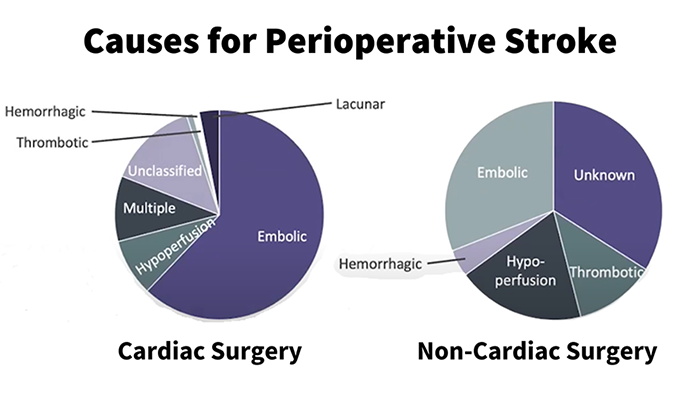
An important risk factor of experiencing a perioperative stroke is if a patient had already had a stroke not long before surgery. In fact, it is best to delay elective surgery procedures at least six to nine months after a stroke to reduce the chances of having another stroke during or after surgery.
MSc Candidate Jaycee Farmer outlined their current work to develop a risk prediction model to better understand why perioperative stroke happens. The model will use a dataset that has information from more than nine million surgical patients.
Want to learn more? Watch the March WiP!
How to design clinical trials to increase enrollment and impact: Patient-oriented approaches to trial design
With CHÉOS Program Head of Decision Sciences Dr. Nick Bansback, CHÉOS Scientist Dr. Mark Harrison, CHÉOS Postdoctoral Fellow Dr. Rebecca Metcalfe
Our April Wip Seminar, focused on patient-oriented approaches to clinical trial design, started with Dr. Nick Bansback setting the scene by introducing the SCOT trial. This study was originally designed to recruit 226 patients for stem cell transplantation to treat scleroderma but struggled to enroll patients. The issue? Clinical trial design.
To conduct a successful clinical trial, the presenters emphasized the importance of understanding what is genuinely important to potential participants. With regard to the SCOT Trial, Dr. Mark Harrison described a discrete choice experiment that documented and ranked what matters to patients with scleroderma when designing a clinical trial. Their preferences include the following:
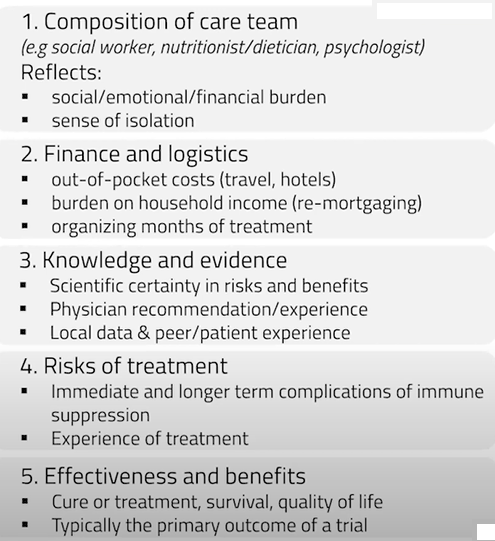
In addition to supporting clinical trial design, patient preferences are also important in interpreting clinical trial results. Dr. Rebecca Metcalfe discussed how vital it is to understand what patients prioritize when it comes to their treatment outcomes. Surveying patients to discern their preferences is a step in the right direction to improve trial interpretation and impact. Read more about this work here.
Want to learn more? Watch the April WiP!
This work was also the focus of a Putting Patients First article discussing how decision sciences can improve the real-world impacts of clinical trials.
Identifying & predicting medication adherence trajectories in patients after heart attack: Challenges & implications
With CHÉOS Scientist Dr. Ricky Turgeon
Did you know that only ~50% of heart attack patients take all their medications? In his WiP Seminar, Dr. Ricky Turgeon discussed medication adherence, an important factor when treating patients living with heart disease.
There are several factors that impact patient adherence:
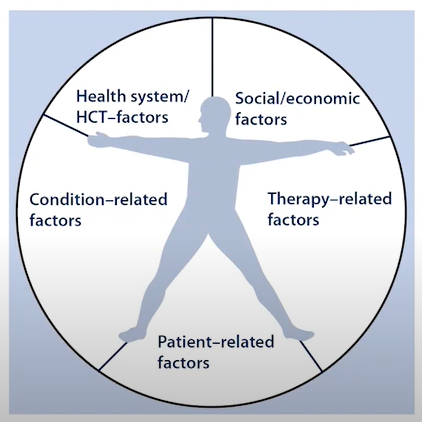
To better understand medication adherence patterns, and discover ways to improve adherence, Dr. Turgeon used group-based trajectory modeling, a statistical method that identifies different groups within a study using longitudinal data. Dr. Turgeon found that patients tend to fall into three categories when it comes to not taking medication consistently: 1) forget to take their medication a few times a month, 2) stop taking their medication after 3 months, and 3) never took their medication. Understanding the reasons behind these three medication patterns can help tailor interventions for patients to promote medication adherence.
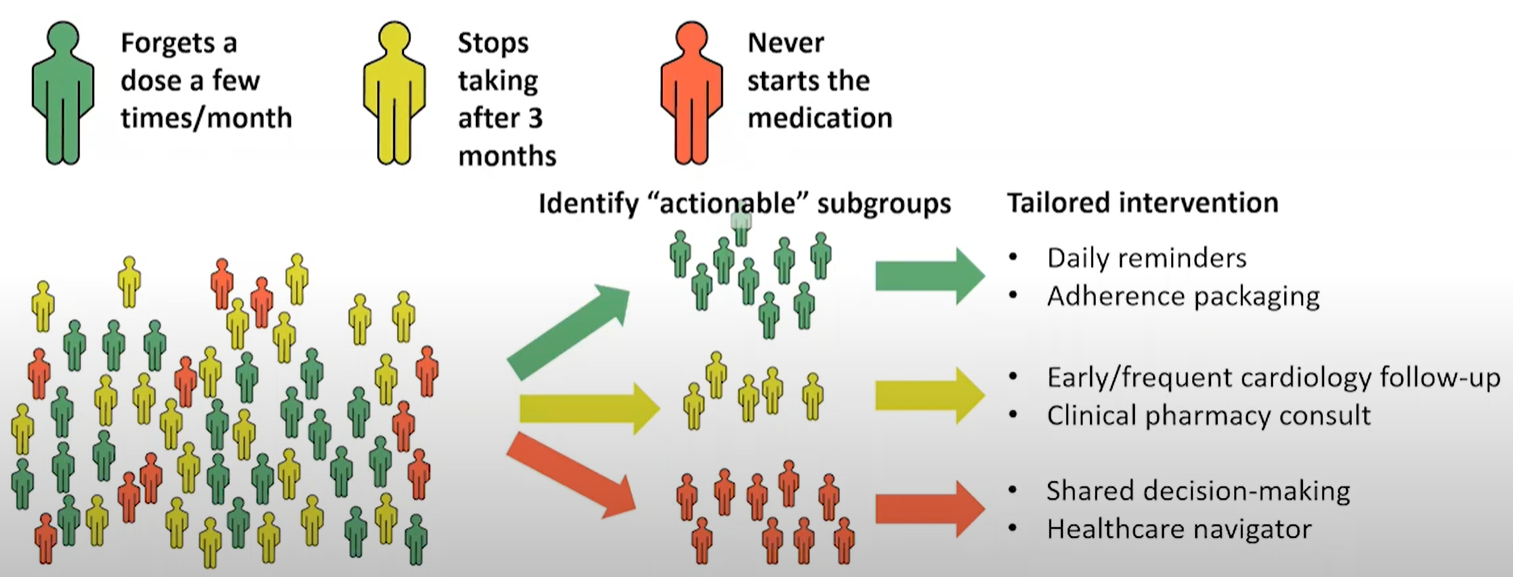
What is the future of cardiovascular medication adherence?
Dr. Turgeon recommends tailoring interventions to address the barriers to adherence.
Want to learn more? Watch the May WiP!
Data-driven, patient-powered Colorectal Cancer Outcomes Research (CCOR)
With CHÉOS Scientist Dr. Mary De Vera
Dr. Mary De Vera started our final #WiPSeminar of the season by sharing her personal colorectal cancer treatment journey.
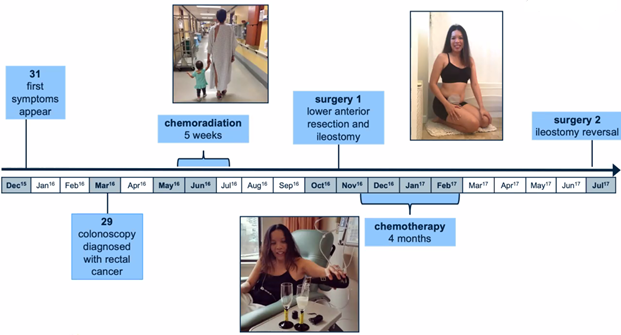
Later transitioning from colorectal patient to colorectal researcher, Dr. De Vera explained how she valued the opportunity to meet other patients — including some she followed on social media — and learned that many patients do not relate to being called a “cancer survivor”. She later published work discussing this term, specific to colorectal cancer patients.
After observing the huge audience engagement garnered through young colorectal cancer patients sharing their stories on Twitter, Dr. De Vera decided to use social media for her STORY study in collaboration with Colontown – Here With You. She shared results via a Tweetorial that you can read here.
Curious to know if a Tweetorial influenced publication metrics?
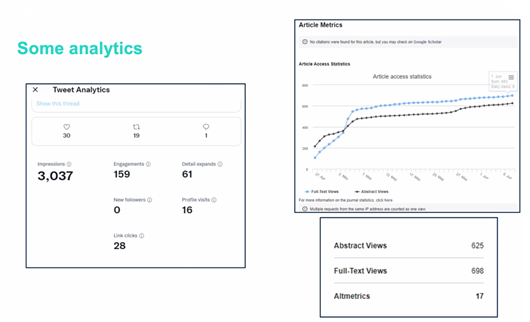
Dr. De Vera’s colorectal cancer Tweetorial had over 3,000 impressions leading to hundreds of abstract and full-text views of her published work!
Want to learn more? Watch the June WiP!
Note: Images have been screen-captured from the WiP presentations and may be slightly modified for this article. Previously published figures have been referenced in the image caption.



